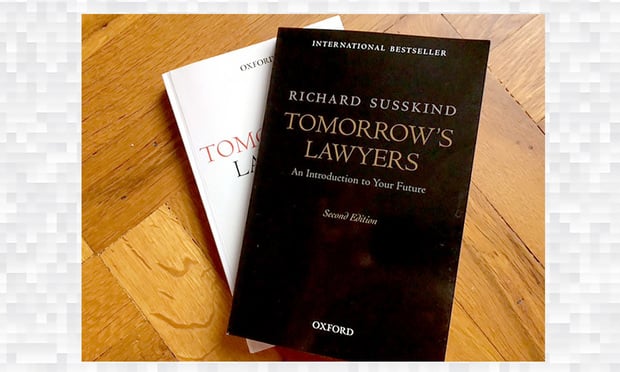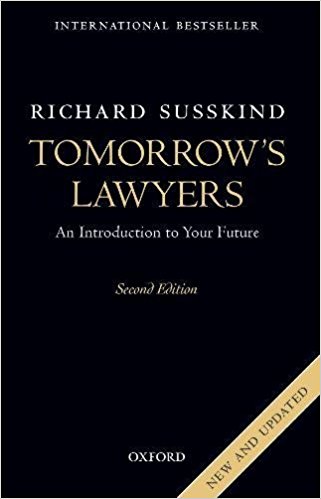Richard Susskind on Document Automation and Connectivity
Four years ago, Richard Susskind published the first edition of “Tomorrow's Lawyers: An Introduction to Your Future.” With the rapid changes…
October 27, 2017 at 09:28 AM
4 minute read
 Richard Susskind's Tomorrow's Lawyers.
Richard Susskind's Tomorrow's Lawyers.
Four years ago, Richard Susskind published the first edition of “Tomorrow's Lawyers: An Introduction to Your Future.” With the rapid changes in the legal profession, tomorrow is now today.
The second edition of “Tomorrow's Lawyers” focuses more sharply on how artificial intelligence, alternative business structures, low-cost law firm service centers, legal tech startups and evolving in-house roles are changing the way legal services are delivered and how law schools are educating students to meet those changes.
To that end, ALM during October is publishing excerpts across several of our brands from the second edition to spark thought and conversation about the industry's future among the legal profession's leaders. ALM editors and reporters have solicited reactions—positive and negative—to Susskind's ideas from law firm chairs, top legal educators, general counsel, law students and industry analysts to get their take.
Gabrielle Orum Hernández spoke with the legal tech community to get their views on Susskind's thoughts on document automation and connectivity. That piece can be read here. From Susskind's book:
Document Automation
These systems, as described in Chapter 3, generate relatively polished and customized first drafts of documents, in response to questions asked of their users. Much of the early work in this field, in the 1980s, was devoted to systems that could generate wills. Since then, the same technology has been applied in far more ambitious contexts such as the production of loan documentation for large-scale banking transactions. Document automation can therefore be used within legal businesses or made available online, and is disruptive for lawyers who charge for their time, because it enables documents to be generated in minutes whereas, in the past, they would have taken many hours to craft.
Not quite as sophisticated as full-scale automated document assembly systems are those online services that provide users with basic document templates. This was the original business of LegalZoom, a US-based company that makes legal documents available to citizens and businesses who cannot afford lawyers or wish to spend less (and here is the disruption) on their legal issues. LegalZoom and its main competitor, Rocket Lawyer, have now served many millions of customers and their brands are better known in the US than most law firms. In a similarly disruptive manner, one UK-headquartered company, Epoq, provides systems and templates that enable banks and insurance companies to provide online services (including document production) to their own clients.
Relentless Connectivity
This refers to systems that together prevent lawyers from entirely disengaging from their clients and the workplace. The technologies include handheld devices, tablets, wireless broadband access, high definition video conferencing, instant messaging, social media, and email; all bolstered by increasing processing power and storage capacity. When these technologies combine, and the machines (of whatever kind) are switched on, which seems now to be all of the time, the 'presence' of lawyers is increasingly visible to their network of contacts. In turn, clients and colleagues will have and expect to have immediate access to lawyers. This can be disruptive for the working and social lives of lawyers. It is a sobering thought too that we seem destined to become more and not less connected, so that the disruption of relentless connectivity is likely to intensify rather than diminish.

Excerpted with permission from Tomorrow's Lawyers by Richard Susskind. For more information, click here.
This content has been archived. It is available through our partners, LexisNexis® and Bloomberg Law.
To view this content, please continue to their sites.
Not a Lexis Subscriber?
Subscribe Now
Not a Bloomberg Law Subscriber?
Subscribe Now
NOT FOR REPRINT
© 2025 ALM Global, LLC, All Rights Reserved. Request academic re-use from www.copyright.com. All other uses, submit a request to [email protected]. For more information visit Asset & Logo Licensing.
You Might Like
View AllTrending Stories
- 1We the People?
- 2New York-Based Skadden Team Joins White & Case Group in Mexico City for Citigroup Demerger
- 3No Two Wildfires Alike: Lawyers Take Different Legal Strategies in California
- 4Poop-Themed Dog Toy OK as Parody, but Still Tarnished Jack Daniel’s Brand, Court Says
- 5Meet the New President of NY's Association of Trial Court Jurists
Who Got The Work
J. Brugh Lower of Gibbons has entered an appearance for industrial equipment supplier Devco Corporation in a pending trademark infringement lawsuit. The suit, accusing the defendant of selling knock-off Graco products, was filed Dec. 18 in New Jersey District Court by Rivkin Radler on behalf of Graco Inc. and Graco Minnesota. The case, assigned to U.S. District Judge Zahid N. Quraishi, is 3:24-cv-11294, Graco Inc. et al v. Devco Corporation.
Who Got The Work
Rebecca Maller-Stein and Kent A. Yalowitz of Arnold & Porter Kaye Scholer have entered their appearances for Hanaco Venture Capital and its executives, Lior Prosor and David Frankel, in a pending securities lawsuit. The action, filed on Dec. 24 in New York Southern District Court by Zell, Aron & Co. on behalf of Goldeneye Advisors, accuses the defendants of negligently and fraudulently managing the plaintiff's $1 million investment. The case, assigned to U.S. District Judge Vernon S. Broderick, is 1:24-cv-09918, Goldeneye Advisors, LLC v. Hanaco Venture Capital, Ltd. et al.
Who Got The Work
Attorneys from A&O Shearman has stepped in as defense counsel for Toronto-Dominion Bank and other defendants in a pending securities class action. The suit, filed Dec. 11 in New York Southern District Court by Bleichmar Fonti & Auld, accuses the defendants of concealing the bank's 'pervasive' deficiencies in regards to its compliance with the Bank Secrecy Act and the quality of its anti-money laundering controls. The case, assigned to U.S. District Judge Arun Subramanian, is 1:24-cv-09445, Gonzalez v. The Toronto-Dominion Bank et al.
Who Got The Work
Crown Castle International, a Pennsylvania company providing shared communications infrastructure, has turned to Luke D. Wolf of Gordon Rees Scully Mansukhani to fend off a pending breach-of-contract lawsuit. The court action, filed Nov. 25 in Michigan Eastern District Court by Hooper Hathaway PC on behalf of The Town Residences LLC, accuses Crown Castle of failing to transfer approximately $30,000 in utility payments from T-Mobile in breach of a roof-top lease and assignment agreement. The case, assigned to U.S. District Judge Susan K. Declercq, is 2:24-cv-13131, The Town Residences LLC v. T-Mobile US, Inc. et al.
Who Got The Work
Wilfred P. Coronato and Daniel M. Schwartz of McCarter & English have stepped in as defense counsel to Electrolux Home Products Inc. in a pending product liability lawsuit. The court action, filed Nov. 26 in New York Eastern District Court by Poulos Lopiccolo PC and Nagel Rice LLP on behalf of David Stern, alleges that the defendant's refrigerators’ drawers and shelving repeatedly break and fall apart within months after purchase. The case, assigned to U.S. District Judge Joan M. Azrack, is 2:24-cv-08204, Stern v. Electrolux Home Products, Inc.
Featured Firms
Law Offices of Gary Martin Hays & Associates, P.C.
(470) 294-1674
Law Offices of Mark E. Salomone
(857) 444-6468
Smith & Hassler
(713) 739-1250






